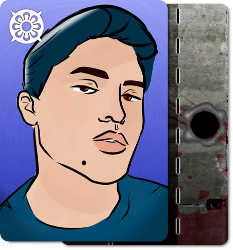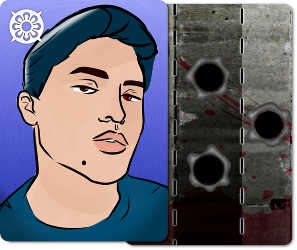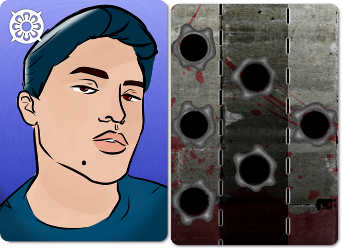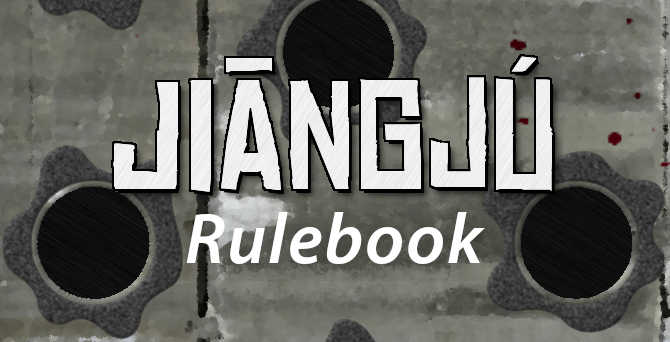
Who remembers how these stories start? So many different ways. Sometimes it’s one of the few good cops, in deep cover with the organised crime families, trying to find the one secret, wanting to just last long enough to get out alive.
Sometimes it’s a cop, whose past pulls stronger loyalties than the badge can be. Who knows what oaths can mean, to the right family.
Sometimes, it’s a romance, people who fall in love across the great divide of law and crime and class.
Who even remembers how these stories start.
They always end the same way.
At an impasse.

Introduction
僵局 (Jiāngjú) is a game of the standoff that comes at the end of a long story of high tension, betrayal, and violent crime. The word translates in English, roughly, to Impasse.
Access
Jiāngjú is a game of bluffing and tension. For the duration of a round of play, players are going to be threatening each other with pointed fingers. In expanded modes of play, players will sometimes need to be able to close their eyes, or stare at other players. If you’re going to play the game, each player needs to be able to do these things. If someone can’t, make sure, ahead of time, you have some way to accommodate those players.
In Storytelling mode, players are going to improvise narrative on their own. While this game draws from Hong Kong Cinema, and hard boiled action movies, still be respectful of one another as players, and recognise that some themes are best not made part of a game where you’re pointing your fingers at people and making gunshot noises.
If players have a hard time holding up their arms for a few minutes at a time, players will need some way to indicate who they are pointing at. Also, in some modes of play, players might have two guns, rather than just one.
If players aren’t comfortable or capable of closing their eyes, or staring respect that. Consider using beads or markers so a player can indicate ‘I am staring at this player.’
And always: Remember to respect the players and their needs.
Components
In your copy of Jiāngjú, you should have the following 20 cards:
- 1 Faction card, showing the Syndicate and the Official symbols on each side.
- 3 Point cards, showing one, two, or three doves.
- 8 Identity Cards
- 4 Syndicate cards
- 4 Official cards
- 8 Role cards, with tension trackers on the back.
Each player should also have a gun, which is to say, their hand.

You don’t need any other components to play Jiāngjú. However, it’s possible that some players may want some counters or pointers that can let them indicate the use of special abilities such as you can find on some Identity Cards.
How To Play
Tension
Jiāngjú is a game where you and your friends are caught in the last moments of a tragic story of corrupt cops and noble robbers, trying to work out who’s right and who’s wrong. Everyone has their gun out, and is pointing it at someone, waiting for the moment when someone pulls the trigger and everyone fires.
The central mechanic of Jiāngjú is Tension. Each player has a facedown Role card, with a tension tracker on the back. Then, players put a Identity Card on top of that to cover the entire card, like so:
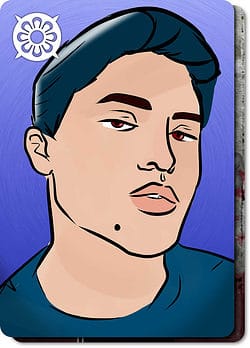
In each version of the game, tension increases when you change your target. You show this by moving the card one row to the left on the tension card. The tension increases by stages.
One Two Three
Tension is the resource the game runs on. When the tension gets too high (in other words, reaches three), all opportunities to change your fate have run out. Guns are fired, and it falls to fate to see who lives, and who dies.
In some modes of the game (usually smaller ones), you use shared tension: Whenever anyone changes their target, everyone increases their tension tracker. When the tension hits 3, everyone fires their guns, and play moves on to the next stage.
When you’re not using shared tension, you use individual tension: Whenever a player does something to increase Tension, only that player increases their own tension. In individual tension games, when your tension track is at 3, you can’t do anything to increase the Tension any more. So you can’t change your target or use special abilities that increase your tension.
The trick, then, relies on convincing other people to change who they’re pointing their guns at, trying to guess what secrets people are hiding, and divining loyalty in as few moves as possible.
Identity Cards
Identity Cards show four members of the two factions.

The Syndicates are members of a brutal criminal organisation, one that enforces it own form of law with power, violence, threats and fear. Terrible, dangerous, but also, morally complex, providing safety for many with no other place to turn.
The Officials are representatives of the legal authorities of the city. They’re cops,
investigators, bureaucrats, and they know they’re part of the corrupt workings of the city. Maybe they’ve given in to the poison, and maybe they spend their days fighting it.

Powers
Each Identity Card has two sides. They’re functionally identical, but one side shows special abilities, known as Powers that the player with that card can have. Powers are for making games more complicated, for adding a dash of spice to larger games. In smaller games they’re not necessary and tend to slow things down.
Role Cards
Your face-down card, with the tension tracker on the back, is your Role Card. This card shows what you’re worth if players are using points, and who you really work for.
Your Role bears one of four possible faction symbols:

Loyalist symbol: You’re on the team indicated by your Identity Card.


Official or Syndicate symbol: You’re a member of the indicated team. Whether you are a traitor or a loyalist depends on whether or not this matches your identity card.

Traitor Symbol: You’re on the opposite team to the one indicated on your Identity Card.
These identities only matter if you’re playing the Full mode of the game. In Fast Mode, the only important Role card is the Traitor.
Guns
In Jiāngjú, you don’t just belong to a side: You’re also armed. To draw your gun, make a gun with your hand and point it. Trigger discipline is optional. You start the game pointing your gun at someone. You don’t get to shoot your gun (killing the person it’s pointed at) until all the tension trackers are full.
When the time comes to fire, though—you say Bang (as loudly as is appropriate for whatever kind of gun your hand is) and people see where the bodies fall.
Lowering Your Gun
You can, if you want, lower your gun. This involves pointing your gun down, but it does increase tension. Also, you can’t bring it back up. If your gun is lowered, you are presenting yourself as a non-threat, but that doesn’t mean you can be complacent.
If everyone lowers their gun there’s a special secret ending where you all get flowers.
Cocking Your Gun
What if you want to increase the Tension and bring the game end closer, but don’t want to change your target? You’re absolutely confident you’ve got the traitor in your sights? Well, in that case, you can cock your gun. Declare it somehow—You don’t have to make a clicking sound and wiggle your thumb, but really, why wouldn’t you?—And then you’ve cocked your gun, increasing tension.
You can’t un-cock your gun or cock the same gun twice. If you have
two guns, you can cock each one separately.
When you cock your gun, everyone else has a chance to change their target without increasing tension. Be careful about when you do this—you might find players take it as a sign they should be pointing their guns at you.
Game Modes
When you play Jiāngjú you choose a game mode to play. Different modes are good for different groups and how much time you have to play. The three major ways to play are Fast Mode, Full Mode and Story Mode.
Remember, all of these rules are flexible. You may want to play with powers, you may want to play without them. Just make sure players know at the start of the game how you’re going to play—Jiāngjú is a short game, so don’t be afraid of mixing up the rules a little to create interesting new scenarios.
Fast Mode
| Players: | 3-4 |
| Identity Cards: | One for each player, all matching |
| Traitors: | One |
| Powers: | Not recommended |
| Tension: | Shared |
In Fast Mode, players are all members of the same faction. They know there’s a traitor in the group—and that’s all they know. Each player can look at their Role card, but the only Role card that matters is the Traitor’s. Once play starts, players have to try and convince one another to shoot the traitor, to not shoot themselves.
This game is meant to be played quickly and doesn’t use the scoring system or powers at all. This game splits into two teams, the Traitor and the Loyals.
The Traitor Wins If:
- All the players die, or
- The Traitor survives
The Loyals Win If:
- At least one non-traitor player survives, and
- The Traitor dies
Full Mode
| Players: | 5-8 |
| Identity Cards: | One for each player, as close to an equal number of Officials and Syndicates as possible. |
| Traitors: | At least one |
| Powers: | Not necessary, but can add to the game once everyone’s comfortable. |
| Tension: | Individual |
In Full Mode, players are all members of the same faction. They know there’s potentially at least traitor in their group, or maybe they have an undercover member in the other group.
In this version of the game, when everyone fires their guns, everyone flips their Role card and players work out who was on what team, and how many points players got.
- First, each team gets 1 point for each living member.
- Then, each team gets points as shown on the Role cards.
The team with the most points gets one of the three point cards, with a number of doves equal to the round, and set it on their side of the faction card.
It’s possible that some arrangements may mean one team has literally nobody on it. In that case, the team that remains has to beat a target score equal to the number of players, otherwise the win goes to the enemy faction.
Once everyone’s corpses have been checked, shuffle up the Roles and Identities, and distribute them again, playing another round. The team that wins the most rounds out of three wins the game.
Story Mode
| Players: | 5-8 |
| Identity Cards: | One for each player, as close to an equal number of Officials and Syndicates as possible. |
| Traitors: | At least one |
| Powers: | Not necessary, but can add to the game once everyone’s comfortable. |
| Tension: | Individual |
Story mode is like Full mode, but players are encouraged to try and come up with a narrative explaining just how they wound up here. In this case, think of the Story mode as more of a roleplaying exercise than a game puzzle, where you’re trying to use story queues and flashback incidents to explain to other players who your Role is… but you have to know the traitor can do the same thing.
Variants And Miscellaneous
Thunderclap Optional Rule
In Thunderclap games of Jiāngjú, players are having their tense standoff during a storm. When the tension trackers are full, everyone closes their eyes and can change their targets while everyone’s eyes are closed. People with their guns lowered can even draw them again during this moment of darkness. Then, when everyone’s ready, count to three, say Bang and everyone opens their eyes.
Oddball Questions
- You can shoot yourself and for thinking to check, well done.
- If you’re shot by two people on different teams, you count as being shot by both—they don’t cancel each other out.
Credits
Game, Rulebook: Talen Lee
Art: Cassandra “Requine” Marshall
Creative Commons Resources: Carl Olsen, Delapouite, John Redman, Lorc, Lord Berandas, Priorblue, Sbed, Viscious Speed & Willdabeast, via www.game-icons.net
Special Thanks:
Fox, for dog-walking
Æryn, for holding on
Doc and Adrienne, for BLOOD HANDS

